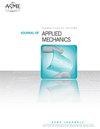Automatedly Distilling Canonical Equations from Random State Data
IF 2.8
4区 工程技术
Q2 MECHANICS
引用次数: 0
Abstract
Canonical equations play a pivotal role in many sub-fields of physics and mathematics. For complex systems and systems without first principles, however, deriving canonical equations analytically is quite laborious or might even be impossible. This work is devoted to automatedly distilling the canonical equations only from random state data. The random state data are collected from stochastically excited, dissipative dynamical systems, experimentally or numerically, while other information, such as the system characterization itself and the excitations are not needed. The identification procedure comes down to a nested optimization problem, and the explicit expressions of the momentum (density) functions and energy (density) functions are identified simultaneously. Three representative examples are investigated to illustrate its high accuracy of identification, the small requirement on data amount, and high robustness to excitations and dissipation. The identification procedure servers as a filter, filtering out the non-conservative information while retaining the conservative information, which is especially suitable for systems with excitations not obtainable.从随机状态数据中自动提取正则方程
正则方程在物理学和数学的许多分支领域中起着举足轻重的作用。然而,对于复杂的系统和没有第一原理的系统,解析地推导标准方程是相当费力的,甚至可能是不可能的。这项工作致力于从随机状态数据中自动提取规范方程。随机状态数据收集随机激发,耗散动力系统,实验或数值,而其他信息,如系统特性本身和激励是不需要的。辨识过程可归结为一个嵌套优化问题,同时辨识动量(密度)函数和能量(密度)函数的显式表达式。通过三个典型的算例分析,说明了该方法识别精度高、对数据量要求小、对激励和耗散具有较强的鲁棒性。该辨识过程作为滤波器,在保留保守信息的同时过滤掉非保守信息,特别适用于无法获得激励的系统。
本文章由计算机程序翻译,如有差异,请以英文原文为准。
求助全文
约1分钟内获得全文
求助全文
来源期刊
CiteScore
4.80
自引率
3.80%
发文量
95
审稿时长
5.8 months
期刊介绍:
All areas of theoretical and applied mechanics including, but not limited to: Aerodynamics; Aeroelasticity; Biomechanics; Boundary layers; Composite materials; Computational mechanics; Constitutive modeling of materials; Dynamics; Elasticity; Experimental mechanics; Flow and fracture; Heat transport in fluid flows; Hydraulics; Impact; Internal flow; Mechanical properties of materials; Mechanics of shocks; Micromechanics; Nanomechanics; Plasticity; Stress analysis; Structures; Thermodynamics of materials and in flowing fluids; Thermo-mechanics; Turbulence; Vibration; Wave propagation

 求助内容:
求助内容: 应助结果提醒方式:
应助结果提醒方式:


